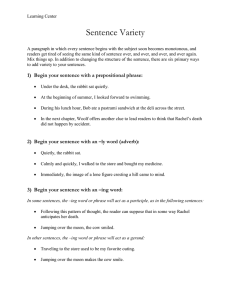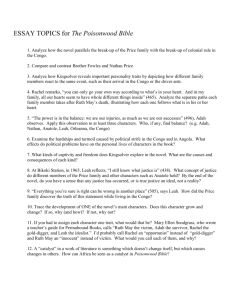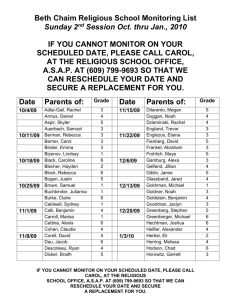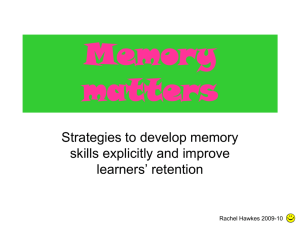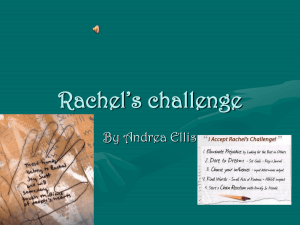File - Bipul Mainali's Electronic Portfolio
advertisement
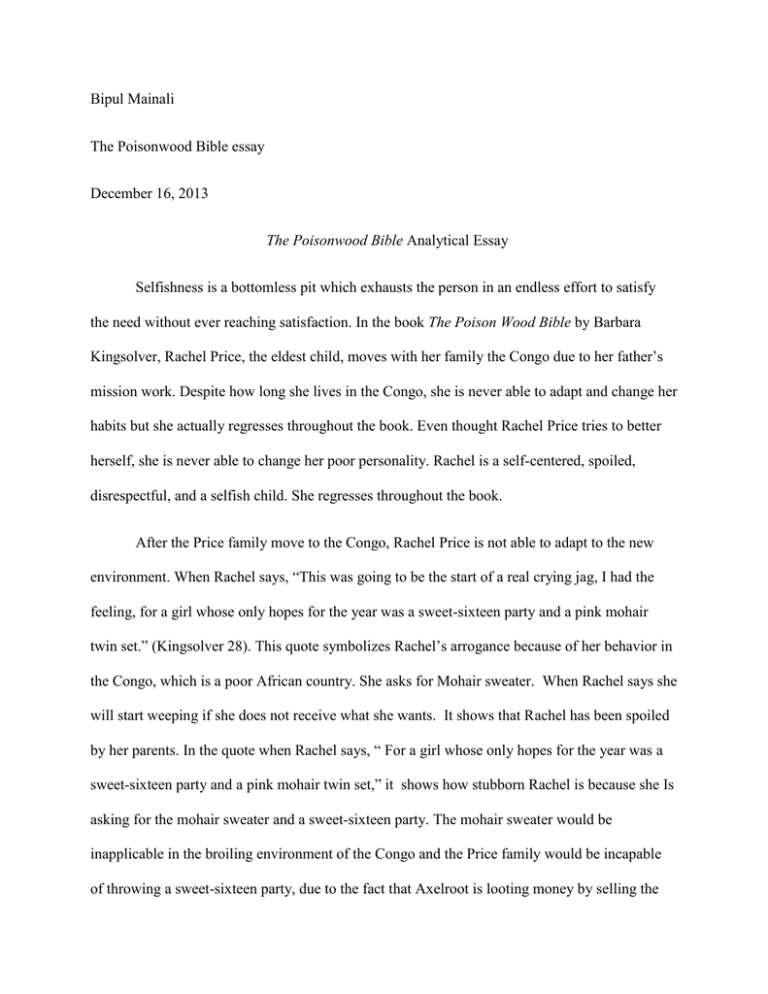
Bipul Mainali The Poisonwood Bible essay December 16, 2013 The Poisonwood Bible Analytical Essay Selfishness is a bottomless pit which exhausts the person in an endless effort to satisfy the need without ever reaching satisfaction. In the book The Poison Wood Bible by Barbara Kingsolver, Rachel Price, the eldest child, moves with her family the Congo due to her father’s mission work. Despite how long she lives in the Congo, she is never able to adapt and change her habits but she actually regresses throughout the book. Even thought Rachel Price tries to better herself, she is never able to change her poor personality. Rachel is a self-centered, spoiled, disrespectful, and a selfish child. She regresses throughout the book. After the Price family move to the Congo, Rachel Price is not able to adapt to the new environment. When Rachel says, “This was going to be the start of a real crying jag, I had the feeling, for a girl whose only hopes for the year was a sweet-sixteen party and a pink mohair twin set.” (Kingsolver 28). This quote symbolizes Rachel’s arrogance because of her behavior in the Congo, which is a poor African country. She asks for Mohair sweater. When Rachel says she will start weeping if she does not receive what she wants. It shows that Rachel has been spoiled by her parents. In the quote when Rachel says, “ For a girl whose only hopes for the year was a sweet-sixteen party and a pink mohair twin set,” it shows how stubborn Rachel is because she Is asking for the mohair sweater and a sweet-sixteen party. The mohair sweater would be inapplicable in the broiling environment of the Congo and the Price family would be incapable of throwing a sweet-sixteen party, due to the fact that Axelroot is looting money by selling the Price family things that they should receive for free. Rachel shows how fond she is of materialistic things while the ants invade the village. Instead of looking for food or something that benefits anyone other than herself, Rachel states, “I only had time to save one precious thing. Something from home. Not my clothes, there wasn’t time, and not the Bible-it didn’t seem worth saving at that moment, so help me God. It had to be my mirror. (Kingsolver 128). In the first sentence, there is a use of the word “precious”. This is a very powerful word because “precious” refers to the mirror, which she risks her life to save. The mirror represents a reflection of herself, which is of utmost importance to her, and also reflection also signifies how other people look at her and how she looks at herself. Another thing is that she says “something from home.” This is very important when you look at the format of the sentence, because it is a fragment. The mirror that she is trying to rescue by risking her life has sentimental value other then it being a reflection of her. It also reminds her of home. Finally when she is running to save her mirror, Rachel thinks to herself in if she should save the bible but she counters that statement by saying “it didn’t seem worth saving at that moment.” The numerous things that Nathaniel taught Rachel about the Christian religion and disappear to thin air. Rachel is stubborn in a way where she will do anything to get what she wants or wants to avoid. In this case, Rachel pretends to marry Axelroot so she can avoid marrying Tata Ndu. The fake relationship turns into a secret affair after Rachel found out that Axelroot is capable of transporting her away from the Congo, which means that she is fine with leaving her family. When Rachel states,” Why marry the cow when you get the milk for free?" This quote illustrates Rachel’s Conventionalism, sexual matters and her stupidity. It illustrates conventionalism when she uses this hackneyed phrase. Sexual matters are illustrated because the true meaning of this quote is asking “Why would Axelroot marry Rachel even though I am giving him sex for free?” The quote illustrates stupidity because Rachel misquotes the expression because the actual quote states, “Why buy the cow when you get the milk for free?” Rachel puts so much effort in trying to leave the Congo, her determination makes her look over her family. When Rachel says,” Until that moment I’d always believed I could still go home and pretend the Congo never happened. The misery, the hunt, and the ants, the embarrassment of all I saw and endured.” (Kingsolver 372). The Congo has been such a bad experience for Rachel that she will do anything to forget it ever happened. This is the reason that she has an increase in the need for materialistic things. In the quote, the word “I” is said a numerous of times. Through the context, Rachel sounds like she is talking in a selfish tone. If Rachel wants their entire kin to leave the Congo, she would have use words like “we” and “us”, which shows unity. Rachel has the average personality of her time. The time era that fits her personality is when people were pro with racial discrimination. Rachel invites Leah to come visit the equatorial before they go pick up Anatole from the prison because Rachel will not have to tell Anatole that blacks aren’t allowed upstairs. When Rachel declares, “I don’t see how those children are any kin of mine.” (Kingsolver 422). The tone of this of this expression sounds very vulgar and disrespectful. When Rachel says “those children,” it refers to Anatole. The tone is disrespectful because Rachel doesn’t even take the time to say the children’s name and she also says that the children are not part of her family because of their race. After Leah declines the invitation to the equatorial, Rachel becomes irate because she thinks that Leah has betrayed her. Rachel proclaims,” She couldn’t even bother herself to come up and see the Equatorial- even though we were only half a day’s drive away! And me a bereaved widow, practically. I can’t forgive that in my own sister.”(Kingsolver 541). When Rachel says this, she is talking in an exclamatory tone to amplify her emotional feelings. She is trying to exaggerate how Leah is ruining her life because her own sister didn’t come to see her hotel. When Rachel states,” even though we were only half a day’s drive away.” She is trying to support her stupendous comment about how Leah cannot come to the Equatorial. Selfishness is a bottomless pit which exhausts the person in an endless effort to satisfy the need without ever reaching satisfaction. Rachel Price is a self-centered, disrespectful, spoiled, and a selfish child. Even though she has a slight progression in the book, she mostly regresses, Bibliography Kingsolver, Barbara. The Poisonwood Bible: A Novel. New York: HarperFlamingo, 1998. Print.
